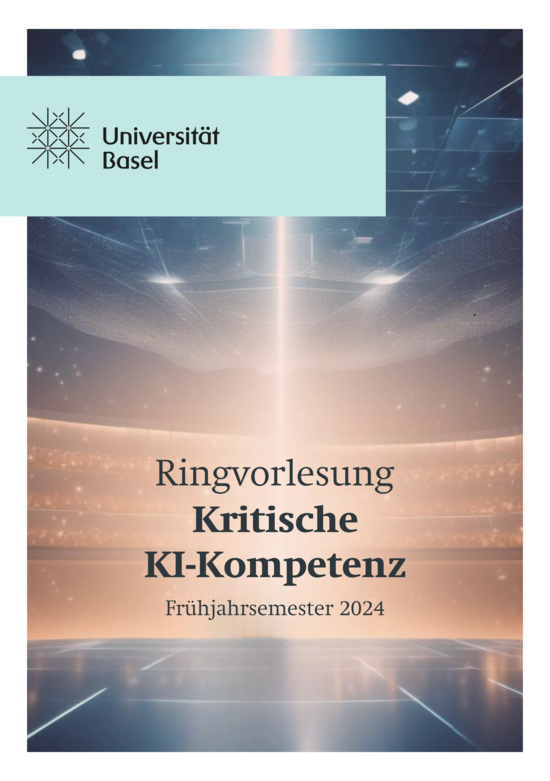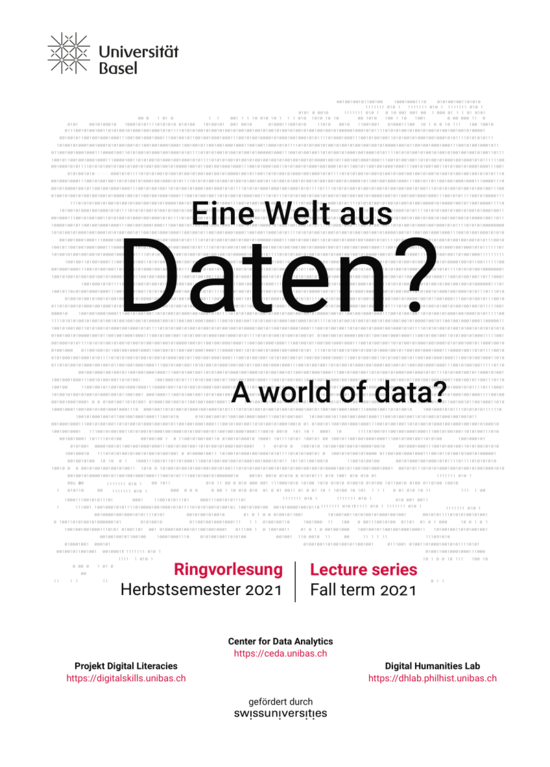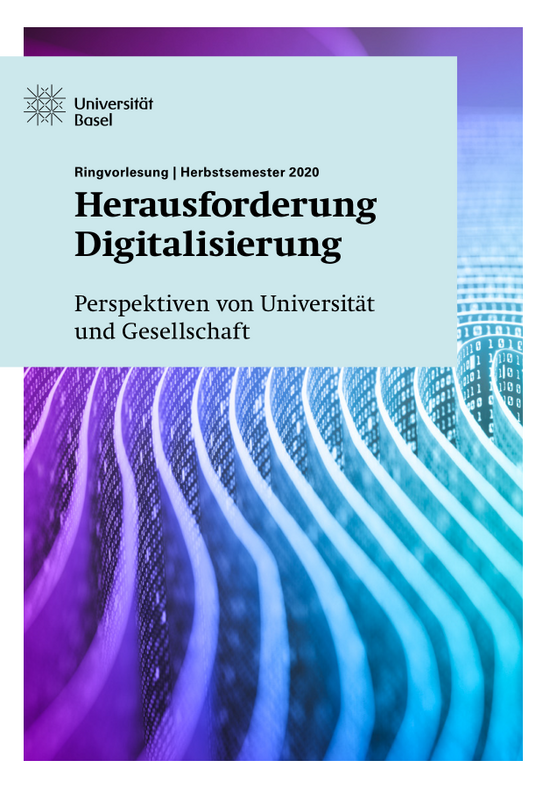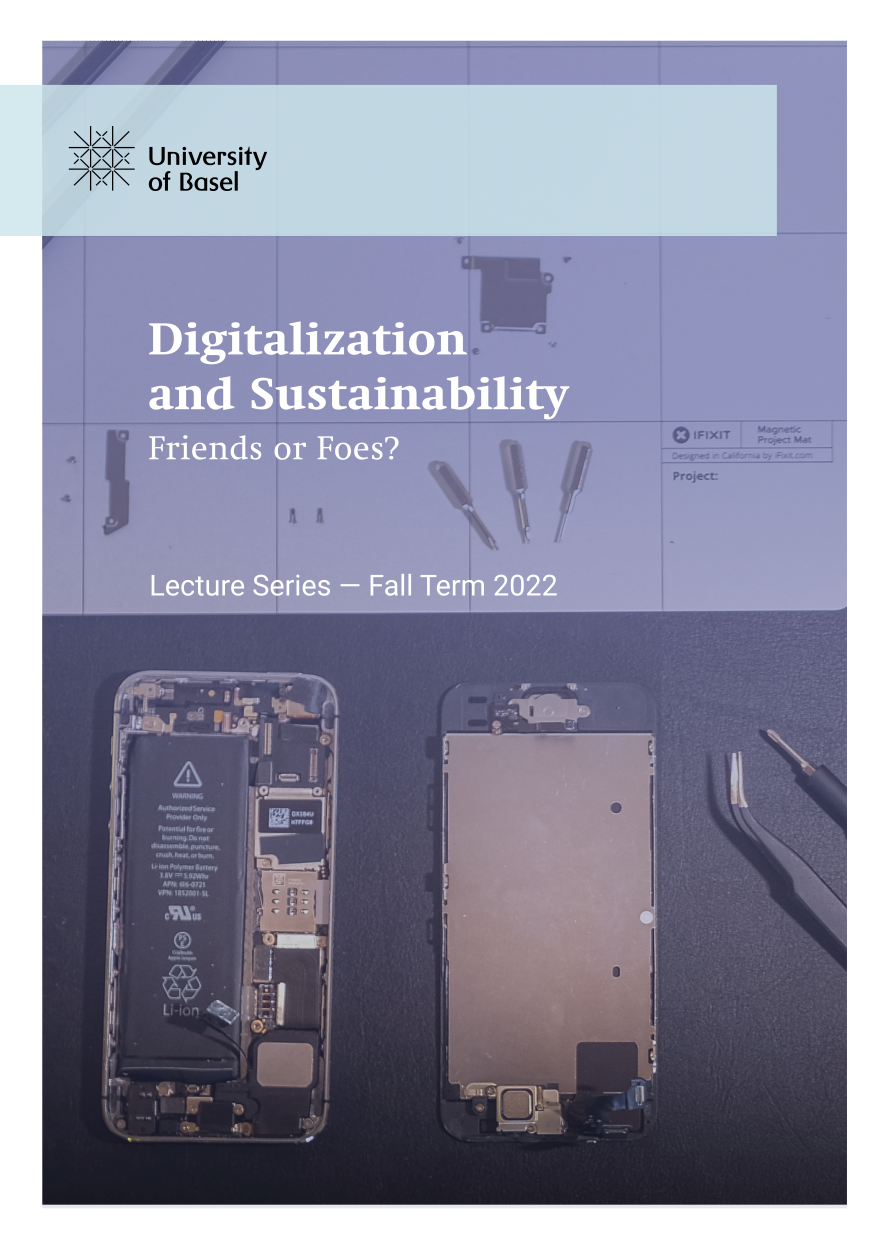Past News and Events: Archive
Project year 2024
Lecture series: Critical AI Literacy

AlphaFold, Midjourney, ChatGPT... For several years now, AI-based tools have been increasingly shaping the research and education landscape. What are the concrete consequences, both positive and negative, of this development?
In this lecture series, experts from various disciplines will present well-founded insights and share their reflection with the public. It is aimed at students of all disciplines, as well as at other University members and the general public, who want to better understand the development of artificial intelligence and acquire «Critical AI Literacy».
More information on this lecture series can be found in the course directory.
Students can register via the usual procedure, other can write an e-mail to digital-literacies@clutterunibas.ch.
The program (in German) can also be downloaded as a PDF file here.
Program
| 29.02.2024 | Einführung – direct link to the recording | Bijan Fateh-Moghadam, Heiko Schuldt, Jean Terrier |
| 07.03.2024 | KI und Maschinelles Lernen: Lernen Maschinen anders als Menschen? – direct link to the recording | Volker Roth |
| 14.03.2024 | To be datafied – or not to be? Macht und Bias in KI – direct link to the recording | Bianca Prietl |
| 21.03.2024 | KI-basierte Bildgenerierung AI and the Subconscious: A Peek into Machine Hallucinations | Vera Chiquet Onome Ekeh |
| 11.04.2024 | Kreativitäts-KI-ckstarts bis zu unerkannten Fehlern – zentrale Kompetenzen für die Verwendung von KI am Beispiel grosser Sprachmodelle – direct link to the recording | Caroline Lehr |
| 18.04.2024 | Vom Schreibknecht zum Schreibcoach? KI-Tools in geisteswissenschaftlichen Forschungsprozessen – direct link to the recording | Martin Luginbühl Mirjam Weder |
| 25.04.2024 | On the use and importance of open-source large language models in behavioral science – direct link to the recording | Rui Mata Zak Hussain |
| 02.05.2024 | Ethical perspectives on AI: the case of life sciences and medicine – direct link to the recording (internal access only: login required) | David Shaw |
| 16.05.2024 | Die Regulierung von KI-Werkzeugen am Beispiel der EU KI-Verordnung – direct link to the recording | Nadja Braun Binder |
| 30.05.2024 | Die Politik der Algorithmen – direct link to the recording (internal access only: login required)
| Sabine Müller-Mall |
The program (in German) can also be downloaded as a PDF file here.
Project year 2022
The Master course «Digitalization and Sustainability: Friends or Foes?» will start on October 10th, 2022
Every year since 2020, the Project Digital Literacies organizes a lecture series on a different topic related to digitalization.
In 2022, the project has teamed with Prof. Frank Krysiak (Faculty of Economics) and Arne Menn (Head of Sustainability) to organize an innovative master course on sustainability. In order to allow for the general public to benefit from the content of the course, the talks and discussions will be recorded and published online.
You can find detailed practical information about this course in the course directory of the University of Basel.
The flyer of the lecture series can be downloaded here (PDF document, 2.8MB).
Course summary
In the last decade of the 20th century, many early enthusiasts of the emerging digitalization process regularly emphasized a positive side-effect of this transformation: digitalization, they argued, would allow for a more sustainable, less resource-hungry form of social and economic development.
In the past twenty years, this optimistic discourse has given way to a much grimmer picture. Overuse of raw materials to produce digital devices, new forms of precarious labor, social fragmentation, spread of false information as a result of fake news and political polarization: all these phenomena and many more have now turned into standard headlines.
Digitalization in its current form, on the one hand, and sustainable development, on the other, do not seem to necessarily belong together after all. But is a combination of these two goals really out of the question? If not, what should be changed in the digitalization process to make it more sustainable?
In this lecture series, we will hear twelve experts in their field present their views on the challenge posed by digitalization to sustainable development, as well as on how to render these two processes more compatible than they seem to be now.
Programm
| 10.10.2022 | Dr. Grischa Beier (online), Dr. Fritz Brugger | «A green digitalized economy? Challenges and opportunities from a resource perspective» |
| 17.10.2022 | Prof. Frank Krysiak, Prof. Paul Burger | «The social contexts of digitalization and their impact on sustainability» |
| 24.10.2022 | Prof. Fabian Schär, Prof. Heiko Schuldt | «The technologies of information & communication and their environmental impact» |
| 31.10.2022 | Prof. Lorenz Hilty, Prof. Tilman Santarius (online) | «Efficiency, consistency and sufficiency in the digital age» |
| 07.11.2022 | Prof. Matthias Stürmer, Prof. Peter Seele | «Sustainability & digitalization: perils and pathways between solutionism and skepticism» |
| 14.11.2022 | Prof. Nadja Braun Binder, Prof. Elena Mugellini | «Changing law, humanizing technology: towards a sustainable digitalization?» |
Project year 2021
Lecture Series (Ringvorlesung), Fall term 2021
«A World of Data? Reflections on a Global Social Transformation»
This fall term, as every year, the Project Digital Literacies organizes a lecture series (Ringvorlesung) to promote a reflective approach to digitalisation. The lecture series is the result of a close cooperation between the Project Digital Literacies, the Center for Data Analytics and the Digital Humanities Lab, with the support of swissuniversities. This term, the focus of our investigation will be data and datification.

«A World of Data? Reflections on a Global Social Transformation»
With the trends towards digitization in virtually all areas, the interconnection of computers by way of the internet, and the emergence of automatic, algorithmic ways to collect data, we have witnessed an explosion of the quantity, quality, and accessibility of data.
What can we currently do with data? What will we be able to do in the future? How to ensure that data is put to good use, e.g. for research as opposed to surveillance? What is the role of single individuals in this, and what is the role of organizations, including public institutions such as universities and administrations?
This lecture series will showcase a few examples of current data-driven research, discuss how social and professional activities are being transformed by data, and provide information on some of the most burning debates.
How to enrol
In this lecture series, some of the sessions will be in English, while others will take place in German.
All sessions take place simultaneously in-class and online via video-conference (Zoom). Please note that for time being only the students of the University of Basel are allowed to follow the lectures in-class.
The link to take part in the sessions via Zoom can be found on the ADAM web page of this course. Interested persons without ADAM access or from the general public are invited to contact digital-literacies@clutterunibas.ch.
Note that all lectures will be recorded and made freely accessible online to the general public after a few days. The links to the videos will be posted on this web page.
You will find more information in the flyer of the lecture series as well as in the course directory of the University of Basel.
Program
Every Monday, 16:00-18:00.
Click on the lecture's title to watch the corresponding video (external link to the Vimeo website or to Panopto)
Project year 2020
September 21, 2020: Lecture series “The Challenge of Digitalization”
Digitization is transforming all areas of society, politics, science and the economy. But what does that mean more precisely? Does it mean that all jobs will be taken up by machines, that politics will structured by filter bubbles, and that all medical diagnostics will be the product of artificial intelligence?
In order to answer these questions and many others, the Project Digital Literacies has organized as transdisciplinary lecture series on the challenges of digitalization. Most lectures will take place in German, but some sessions will be in English.
Please refer to the detailed program on the corresponding German-language page.


